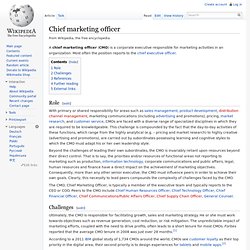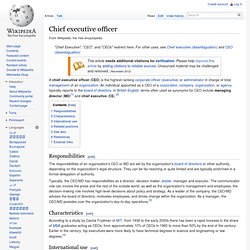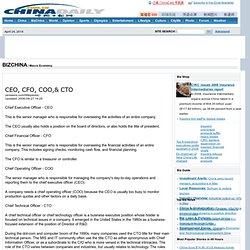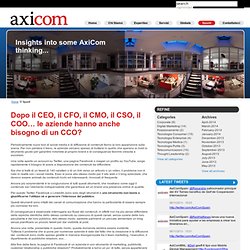

Chief marketing officer. A chief marketing officer (CMO) is a corporate executive responsible for marketing activities in an organization.

Most often the position reports to the chief executive officer. Role[edit] With primary or shared responsibility for areas such as sales management, product development, distribution channel management, marketing communications (including advertising and promotions), pricing, market research, and customer service, CMOs are faced with a diverse range of specialized disciplines in which they are required to be knowledgeable. This challenge is compounded by the fact that the day-to-day activities of these functions, which range from the highly analytical (e.g. – pricing and market research) to highly creative (advertising and promotions), are carried out by subordinates possessing learning and cognitive styles to which the CMO must adapt his or her own leadership style. Challenges[edit] Ultimately, the CMO is responsible for facilitating growth, sales and marketing strategy.
Amministratore delegato. Da Wikipedia, l'enciclopedia libera.

L'amministratore delegato (in acronimo AD, in lingua inglese Chief Executive Officer) è un componente del consiglio di amministrazione di una società per azioni o altra azienda organizzata in modo analogo, al quale il consiglio stesso ha delegato propri poteri. Caratteristiche generali[modifica | modifica sorgente] Negli ordinamenti che, sul modello tedesco, adottano il sistema dualistico di corporate governance, scindendo il consiglio di amministrazione in due organi collegiali, il consiglio di sorveglianza e il consiglio di gestione, il ruolo di capo azienda è svolto collegialmente da quest'ultimo che ha un proprio presidente (Vorstandsvorsitzender in Germania) diverso dal presidente del consiglio di sorveglianza.
Nel mondo[modifica | modifica sorgente] Giappone[modifica | modifica sorgente] Ha solitamente il titolo shachō (社長), traducibile con presidente. Italia[modifica | modifica sorgente] Non possono essere delegate: Chief executive officer. A chief executive officer (CEO) is the highest-ranking corporate officer (executive) or administrator in charge of total management of an organization.

An individual appointed as a CEO of a corporation, company, organization, or agency typically reports to the board of directors. In British English, terms often used as synonyms for CEO include managing director (MD)[1] and chief executive (CE).[2] Responsibilities[edit] The responsibilities of an organization's CEO or MD are set by the organization's board of directors or other authority, depending on the organization's legal structure.
They can be far-reaching or quite limited and are typically enshrined in a formal delegation of authority. Typically, the CEO/MD has responsibilities as a director, decision maker, leader, manager and executor. Characteristics[edit] International use[edit] Differences between CTO CIO CEO COO? CEO, CFO, COO,& CTO. Chief Executive Officer - CEO This is the senior manager who is responsible for overseeing the activities of an entire company.

The CEO usually also holds a position on the board of directors, or also holds the title of president. Chief Financial Officer - CFO This is the senior manager who is responsible for overseeing the financial activities of an entire company. This includes signing checks, monitoring cash flow, and financial planning. The CFO is similar to a treasurer or controller. Chief Operating Officer - COO The senior manager who is responsible for managing the company's day-to-day operations and reporting them to the chief executive officer (CEO).
A company needs a chief operating officer (COO) because the CEO is usually too busy to monitor production quotas and other factors on a daily basis. Chief Technical Officer - CTO A chief technical officer or chief technology officer is a business executive position whose holder is focused on technical issues in a company. Dopo il CEO, il CFO, il CMO, il CSO, il COO… le aziende hanno anche bisogno di un CCO? Periodicamente nuovi tool di social media e di diffusione di contenuti fanno la loro apparizione sulla scena.

Per non perdere il treno, le aziende cercano spesso di buttarsi in quello che sperano si riveli lo strumento giusto per garantire notorietà al proprio brand e di conseguenza favorire crescita e successo. Una volta aperto un account su Twitter, una pagina Facebook o magari un profilo su YouTube, sorge rapidamente il bisogno di avere a disposizione dei contenuti da diffondere. Sia che si tratti di un tweet di 140 caratteri o di un link verso un articolo o un video, il problema non è nato in realtà con i social media. Esso si pone allo stesso modo per il sito web o il blog aziendale, che devono essere animati da contenuti ricchi ed interessanti, rinnovati di frequente. Ancora più sorprendente è la congiunzione di tutti questi strumenti, che mostrano come oggi il contenuto sia l’elemento indispensabile che garantisce ad un brand una presenza online di qualità.